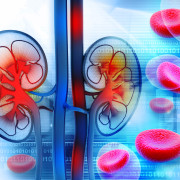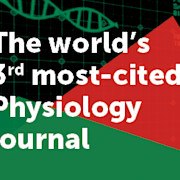- Science News
- Frontiers news
- Celebrating a decade of Frontiers in Physiology
Celebrating a decade of Frontiers in Physiology
Following the recent ten-year milestone of Frontiers in Physiology, we take the opportunity to highlight some of the key achievements over the past decade and what the next ten years has in store.
Frontiers in Physiology’s success could not have been achieved without the leadership of Prof. George Billman from Ohio State University, who has been Field Chief Editor since the journal's launch.
“It has been a privilege to serve as the founding editor of Frontiers in Physiology. I sincerely believe that my role in founding this journal may prove to be my most important contribution to science.”

Prof. John Imig
Sadly Prof. Billman will be retiring from the role this year, but we are happy to announce that he will be passing on the baton to Prof. John Imig of Medical College of Wisconsin. As well as a renowned scientist in the area of cardiovascular and renal physiology, Prof. Imig has led several highly successful Research Topics and published many relevant, impactful articles with Frontiers.
“It is a great pleasure and honor to be the next Field Chief Editor,” he says. “My goals for Frontiers in Physiology are to maintain the high quality, build on the current success, and strive to make the journal’s impact even greater.”
Article highlights
Earlier this year, the journal also published its 10,000th article. One of the first publications was authored by Prof. Ruben Coronel et al. where they provided a mechanistic basis for pro- and antiarrhythmic effects of sodium channel blockers in the absence of structural heart disease. Since then, Prof. Coronel has led the Cardiac Electrophysiology section as Specialty Chief Editor, with this area of research being vital for the section’s growth.
Meanwhile, Prof. Paul Janssen declared exciting times ahead for cardiac muscle physiology research based on the potential impact of molecular intervention tools. In fact, cardiac muscle physiology has been a strong focal point for articles and Research Topics in the Striated Muscle Physiology section, led by Prof. Janssen and Prof. Peter Reiser.
Topping out at almost 500 citations, Dr. Sue Grenham and colleagues were indeed correct that the brain-gut-microbiome communication in health and disease will continue to occupy the minds of researchers from many disciplines. Since this publication in 2011, many members of the scientific community have contributed to this field to further develop the current knowledge in our Gastrointestinal Sciences section and beyond.
These few examples highlight the diverse articles published in Frontiers in Physiology and demonstrate how the research can benefit the scientific community.
Collection highlights
As well as high-impact articles, the journal has launched over 1,000 Research Topics, some of which have received a lot of attention in the field.
With increasing prevalence of exposure to hypoxic conditions though pathological conditions and/or reduced atmospheric oxygen pressure, Dr. Iturriaga and colleagues built a strong collection to update the current knowledge on oxygen sensing mechanisms, physiological responses to acute or chronic hypoxia and the subsequent adaptations. From obstructive sleep apnoea to chronic obstructive pulmonary disease, those habituating in Caspana to Kyrgyz – the publications included have many conclusions of interest.
Not only are humans affected by external stimuli, insects also undergo major changes for development and survival. Prof. Tang and others extensively highlighted the advances in the responses of insects adapting to environmental stressors. These implications are pertinent for advancing the physiological adaptations of insects.

Exercise as a countermeasure to human aging
Finally, ageing is inevitable yet complex and now that the average life span is longer than decades ago, it is important that we can maintain good health, independence and quality of life. Dr. Elliott et al. highlighted the effects of exercise and/or (in)activity on humans for successful ageing, and contributed towards suggesting some of the physiological mechanisms involved.
As a whole, cutting-edge research themes led by experts of the respective fields permit collaboration of researchers across the world to accelerate the science in these and hundreds of other physiological areas. Ideas for new Research Topics can be submitted here for discussion with our editorial office and chief editors.
Specialty Section highlights

The physiology field is evolving fast. Frontiers in Physiology is keeping up with new developments and launching specialty sections to draw light on emerging areas of research. In recent months, the following sections have been launched in the journal:
Led by Prof. John Imig, this section focuses on the biological processes that provide energy to maintain homeostasis. Ten Research Topics are currently featured in this section, found here.
Led by Prof. Andreas Fahlman, this section captures the major findings relating to modern sensing technology for understanding physiological functions in both animals and humans. Ten Research Topics are currently featured in this section, found here.
Led by Dr. Laurence Vico, this section provides a forum for the dissemination of the newest knowledge of the vertebrate skeletal system, pertaining to bones, joints, cartilages and ligaments.
Furthermore, the following sections have been revamped with the recruitment of new specialty chief editors:
Led by Prof. Colin Scanes and joined by Prof. Sandra Velleman, the section showcasing research on wild species of birds together with poultry.
Led by Prof. Warren Burggren, the section welcomes experimental, observational, theoretical and computational studies in developmental physiology.
Led by Prof. Giuseppe D’Antona, the section highlights the physiological mechanisms underlying the acute response to exercise, as well as the adaptation to exercise from the molecular and cellular level to individual systems and extending to the integrated multi-systemic response of the intact organism in both humans and animals.
Led by Prof. Miriam Cortese-Krott, the section is a home for elucidating specific molecular targets, defining redox signalling mechanisms, and determining their contribution in maintaining health or propagate disease.
The journal plans to continue providing new sections for high-quality research the community is interested in.
Our editorial board members keep the journal thriving by handling and reviewing submissions, providing ideas for and leading Research Topics, and acting as ambassadors for open science. During the Covid-19 pandemic, their commitment has been even more appreciated. We recently awarded the most active editors across all sections of our journal with a certificate to acknowledge their dedication. The recipients can be found here. If you are interested in joining our editorial board to shape the future of the journal, please submit your interest through here.
What does the next ten years look like? Frontiers in Physiology will continue to provide a high-quality open access platform for the community. In the short term, we will be shining a light on the technical aspects of our discipline with a series of Research Topics on "Methods and Applications in Physiology". Interlinked across many specialty sections, you can find all the details and submit your manuscript here. Furthermore, the rising stars of physiology will be recognized with a dedicated Research Topic to showcase their contributions to the field. More information on this will be released soon.
Thanks to all the authors, editors, and reviewers who have contributed to our journal over the past ten years. We look forward to the continued collaboration.








